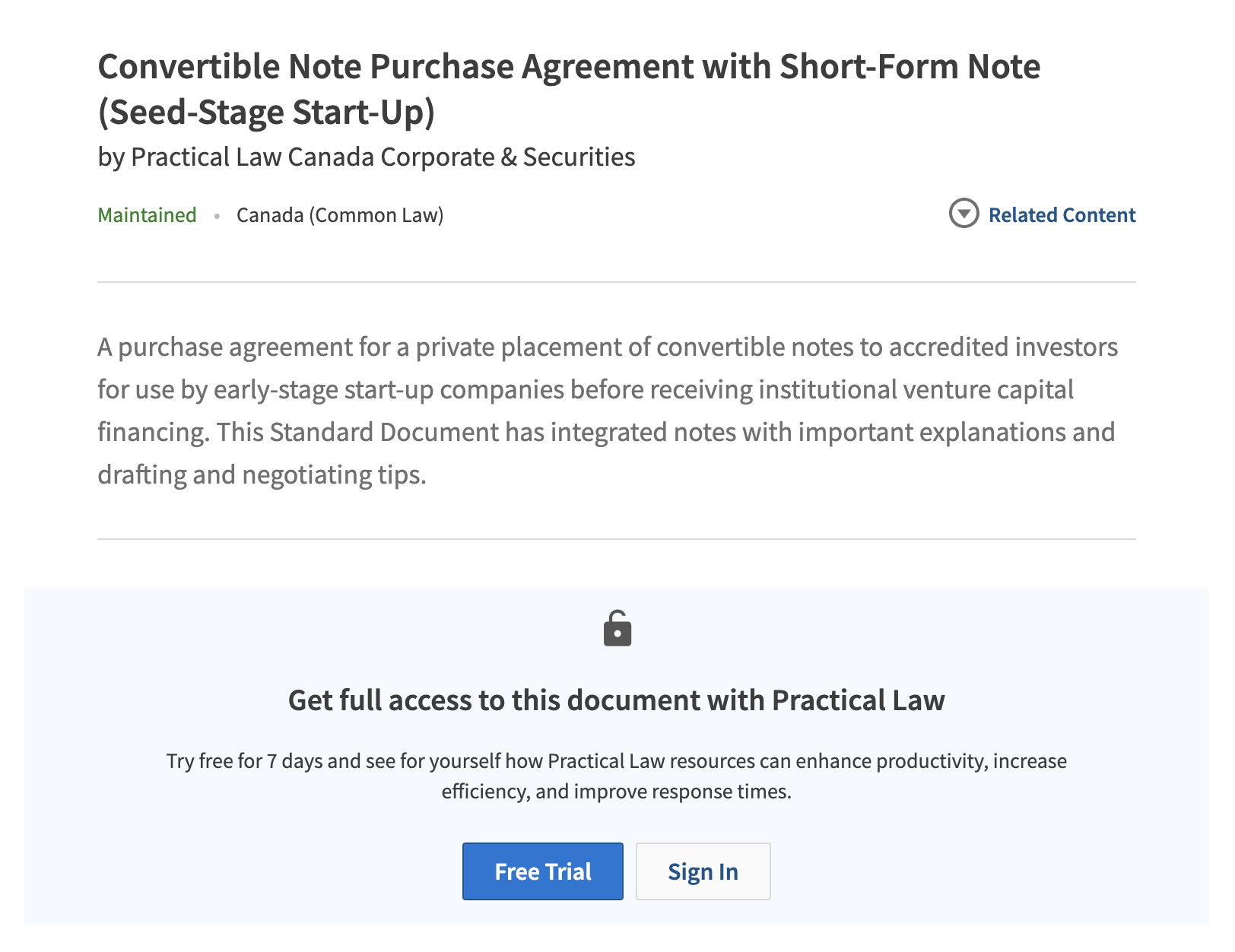Definition, concept overview and resources for in-house legal teams
Transactional law · Securities law · convertible note
Highlights
Often used by startups to raise early-stage funding
Key terms include: principal amount, interest rate, maturity date, conversion discount, and valuation cap
Can be advantageous for both startups and investors, but there are also some challenges and considerations to keep in mind
In the fast-paced world where startups are booming, globalization and innovation are not just limited to the products or services on offer; rather, they are extended to how these will be funded. Among the many financing options available, one instrument that has emerged as a viable option among early-stage investors and entrepreneurs is convertible notes.
The United States market witnessed a remarkable increase in convertible notes in the first quarter of 2023. As per a Goldman Sachs, US companies have issued more than $40 billion of convertibles across 63 deals, from $29 billion and 54 transactions in 2022. The constant rise in the use of the convertible note suggests a stable demand, reflecting their attractiveness as a flexible financing option.
Convertible notes bridge the gap between debt and equity, is revolutionizing how startups secure funding and scale their operations at the same time they ensure that the investor is presented with better options. But what exactly is a convertible note, and why has it become so popular?
Jump to ↓
| Definition |
| Mechanics of convertible notes |
| Advantages for startup issuers and investors |
| Challenges and considerations |

Practical Law standard document
Standard form of NPA and short-form convertible note
Access with free trial ↗What is a convertible note?
According to Black’s Law Dictionary, a convertible note is:
“A security (usually a bond or preferred stock) that may be exchanged by the owner for another security, esp. common stock from the same company, and usu. at a fixed price on a specified date. — Also termed (specif.) convertible debt; convertible stock.”
A convertible note is a short-term debt instrument or agreement that converts from debt to equity at a future date, usually when one of three key events occurs:
- The company raises enough capital to reach a pre-determined benchmark.
- The term of the loan expires.
- The company is sold.
In simpler terms, the investors give loans to the startups in their early stage, at this moment the loan stands as a debt, but in the future the startup either pays back the loan amount with interest or, convert the loan into equity and becomes a shareholder in the company once it had time to mature and grow. The convertible note is like an agreement or contract which is negotiable by the parties to it, the agreement features the following:
- Investor Rights
- Amendments
- Termination Terms
- Repayment Terms/Conversion Terms
- Partial Payment Option
- Debt Guarantees
- Use of Debt
|
Black’s Law Dictionary
What are the mechanics of a convertible note?
The convertible note purchase agreement (NPA) is the principal agreement between the issuer and the investors and sets out the price, terms, and conditions on which the investors agree to buy the convertible notes from the issuer.
Principal amount
Amount that has been invested by the Investor as a debt in the startup company is the Principal Amount, which acts as the loan’s face value.
Interest rate
Some convertible notes accrue interest on the principal amount when they are intended to be repaid as the loan (debt), although the primary benefit for investors generally lies in the conversion to equity rather than interest payments.
Maturity date
The date by which a convertible note must either be converted into equity or repaid with the interest accrued is the Maturity date.
Conversion discount
Conversion Discounts are offered to early investors which can range from 10% to 30% on the price per share during the next equity financing round.
Valuation cap
Valuation cap is the maximum company valuation limit at which the convertible note can be converted into equity, this is generally for protecting the investor’s interest from excessive dilution if the company’s valuation soars.
How are convertible notes advantageous for startup issuers and investors?
Issuer perspective
Convertible notes make it easy for startups to access early funding, which is required to establish the company. This allows startups to focus on growth and product development without getting down into traditional equity deals, ensuring they can scale efficiently and effectively.
Investor perspective
For investors convertible notes provide multiple benefits, such as it allows the investors to benefit from the conversion discounts and valuation caps if the startup raises equity at a higher valuation, securing more equity than through direct investment. On the other hand, it offers the mitigation of risk by the debt nature of the notes that is, if the startup fails to secure additional funding or becomes insolvent, then the investors can recover their investment as creditors.
What are the challenges and considerations for convertible notes?
- If the company’s valuation cap is set too low, then there is a chance of dilution of founders and existing shareholders.
- Convertible notes create uncertainty about the company’s future control and ownership, particularly when multiple notes convert simultaneously.
- As it is well known that the process of traditional equity funds financing is complex, likewise convertible notes might not be that complex, but they still require careful legal drafting to ensure clarity on terms and conditions.
What is SAFE agreement and how does it differ from convertible notes?
A SAFE (Simple Agreement for Future Equity) is an agreement between an investor and a startup that lets the investor buy shares in the company later, usually during a future investment round. Unlike loans, SAFEs don’t have a set repayment date or earn interest, Investors don’t get shares right away but have the right to convert their SAFE into shares later, often at a discount.
Debt vs. equity
A SAFE is not a loan; it doesn’t have interest or a deadline for repayment. In contrast, a convertible note is a loan that earns interest and has a repayment deadline.
Complexity
SAFEs are simpler with fewer legal details, making them easier to manage. Convertible notes are more complex because they involve interest and repayment terms.
Investor risk
With a SAFE, investors may have to wait longer to get shares since there’s no deadline, but they don’t have to worry about the company not being able to repay. With convertible notes, investors have some protection because it’s a loan, but there’s a risk the company might not be able to repay or convert the loan if things go wrong.
Company preference
SAFE is preferred by companies that want to avoid the obligations of debt and the complexities of interest and maturity dates. Convertible Notes are often used when investors want the security of a debt instrument with the potential upside of conversion to equity.

CoCounsel Legal
AI lawyers swear by: Trusted content, expert insights, and an all-in-one solution with ISO/IEC 42001:2023 certification
See it in action ↗Last thoughts and more resources
Convertible notes work like loans that earn interest and have a deadline for when they should either be repaid or turned into shares. This gives investors a clear idea of when they’ll get their money back or their shares, and it protects them from the risk of the company not paying back. Because of this, companies are motivated to get more funding or find an exit plan to avoid repaying the loan.
Convertible notes are a great choice for startups needing quick funding. They are flexible and save time since they don’t require complex equity discussions right away. For both startups and investors, convertible notes offer an efficient way to raise and invest money, making them a popular option for early-stage financing.
Practical Law Practice Notes and Standard Documents
- Key terms and provisions of convertible notes
- Board Resolutions: Convertible Note Financing with Note Purchase Agreement
- Securities Laws in Venture Finance

AI news and insights
Industry-leading insights, updates, and all things AI in the legal profession
Join community ↗








